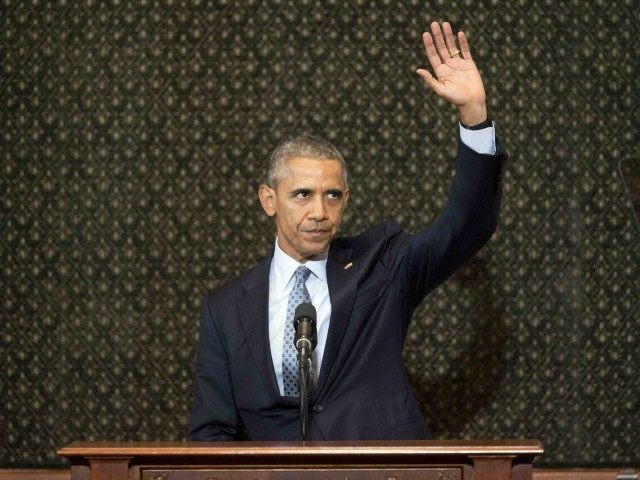Dr. Herbert London of the London Center for Policy Research joined SiriusXM host Stephen K. Bannon on Tuesday’s edition of Breitbart News Daily to present his evaluation of a world in chaos due to the withdrawal of American power.
“Let me suggest to you that we’re engaged in a long war,” said London. “The world is in disarray. The difficulties that we’re having with militant Islam will continue for at least a generation. And it’s not merely a war on the battlefield; it is a doctrinal war.”
“It’s also very much related to the way the Obama administration has conducted itself,” he stated, adding:
What we see is an administration in retreat. This administration in retreat, which believes that withdrawal from international affairs is the appropriate stance, has not played a significant role in attempting to control the Chinese ambitions in the South China Sea, where the Chinese have unilaterally created an air zone, an air perimeter zone, that includes some of the contested islands – the Senkaku and the Spratlys, among others.
London continued:
And so what you’re seeing in Vietnam is an American president who’s reaching out because he doesn’t know what to do, to try and create an environment where the nations affected by China will unite in some sort of defense condominium to offset, and try to thwart, whatever ambitions the Chinese have.
He predicted that the next commander-in-chief will be “handed a mess.”
“There’s no question that the world, as I indicated, is in disarray,” he said. “I think that what you have to find is a president who is capable of restoring the kind of confidence that people once had in the United States.”
London said, “If you speak to the al-Sisis of the world, as I have, what you’ll find is they love America, but they say, ‘America doesn’t love us. We are now in the position where we can no longer trust an ally,’” London said, referring to Egyptian President Abdel Fattah al-Sisi. “If you’re looking at Asia, for example, the Japanese are saying Americans provided a nuclear umbrella, and the presence of the United States Navy in the Pacific clearly provided some confidence that the United States is there to protect our back.”
“No longer do nations in that part of the world have that kind of confidence,” he warned. “No longer do nations in the Middle East believe that the United States stands behind them. Israel is groping, even looking at Sunni allies, rather than think about the United States as a defensive backbone for its defense policy.”
London noted that Israeli Prime Minister Benjamin Netanyahu recently rejected a French attempt to broker an agreement with the Palestinians, but Egypt’s President Sisi approached Israel with his own proposal for the Arab states to recognize Israel as a Jewish state, if they return to their smaller 1967 borders.
“My suspicion – and I have no evidence to support this claim – is that if there were a terrorist attack on an Egyptian airliner, it was due to the fact that al-Sisi made that comment publicly,” said London, referencing the crash of EgyptAir Flight 804. “The very fact that Arab states would be willing to recognize Israel as a Jewish state has unquestionably alarmed militant Islamists around the world.”
Asserted London:
If the United States is not going to deploy a major force across the globe, then what we’ve got to do is create allies and build an environment where those allies are formed into some sort of defense condominium–let’s say a Red Sea treaty, and you get Egypt, and Jordan, and Saudi Arabia, and the Gulf States operating together, with the United States providing logistical support – perhaps some money, perhaps some equipment – and Israel as a kind of unregistered member of this Red Sea treaty organization.
“Something like that has to be established, to offset the Iranian ambitions in that part of the world,” London recommended. “And the United States has to be a lot more clever diplomatically than it has been.”
He said there was a desire in Asia for the kind of defense arrangement he described, “but the Koreans are not going to work with the Japanese.”
“You ask the Koreans, who are the enemy in Asia, they’re not going to say it’s China. They’re likely to say it’s Japan,” he observed, then added:
So it’s very, very difficult for the Japanese to provide that kind of leadership. But if the United States had insinuated itself into a real role in Asia, rather than this fictional “pivot to Asia,” then it seems to me we could play a very significant role in offsetting Chinese ambitions.
“That has not happened,” London declared, noting that the president of the Philippines complained last week that he could not rely on the United States, so the Philippines contemplates the surrender of some disputed islands to China in exchange for security.
“At least we can deal with the Chinese. We know where they stand. They are more reliable than the United States,” he said of the Philippine outlook on the contesting world powers. “That is a remarkable statement because now you see all these nations that should be on our team falling off and going over to the other side.”
Breitbart News Daily airs on SiriusXM Patriot 125 weekdays from 6:00 a.m. to 9:00 a.m. Eastern.
LISTEN:

COMMENTS
Please let us know if you're having issues with commenting.